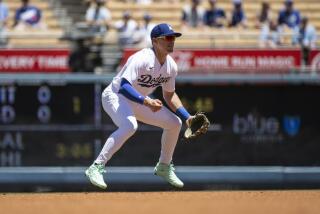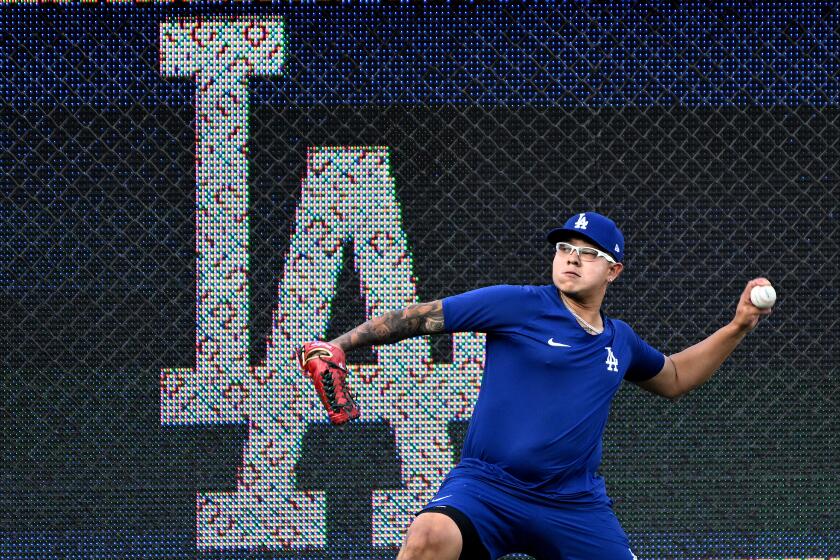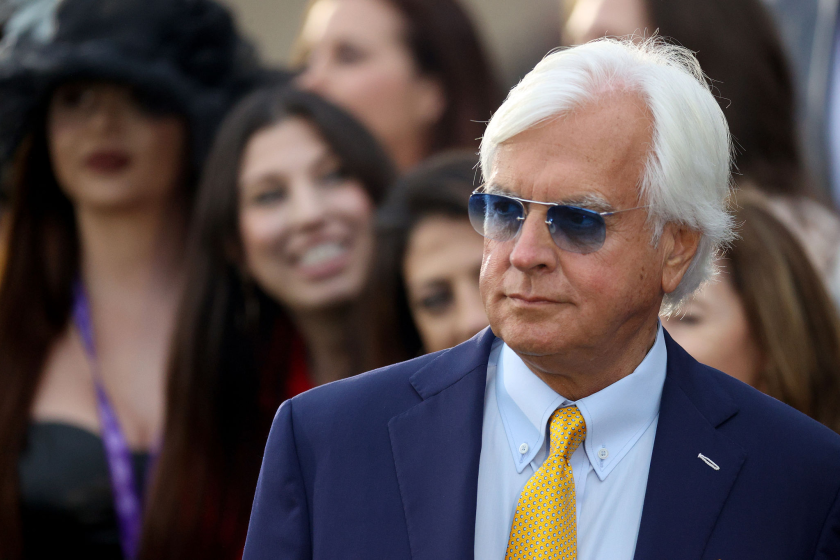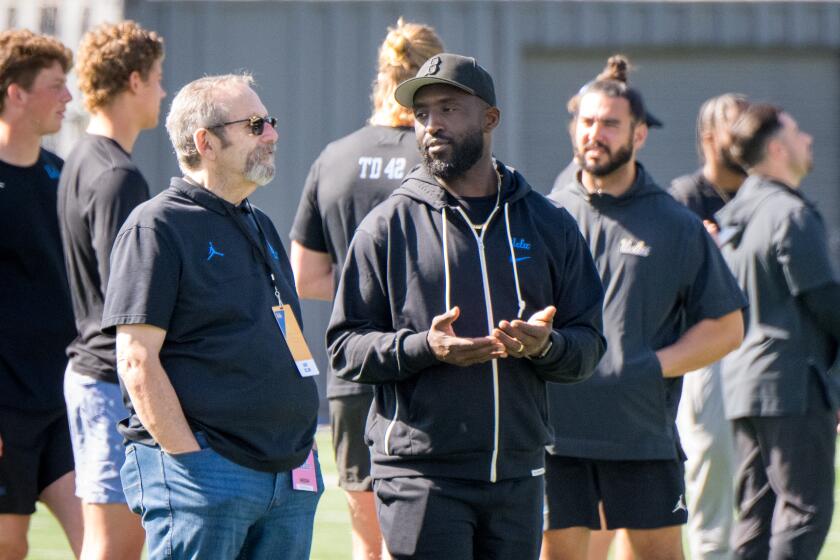Dodgers sign catcher named in Mitchell Report
The Dodgers became the first team to sign a player named in former Sen. George Mitchell’s report on performance-enhancing drugs since it was released last week, as backup catcher Gary Bennett on Monday agreed to a one-year contract with an option for a second season.
Bennett admitted to using human growth hormone, but like Andy Pettitte and Fernando Vina, who were also included in Mitchell’s report, he said he did so only to recover from an injury.
Dodgers General Manager Ned Colletti said that the explanation Bennett gave him Friday convinced him that he was a one-time user and alleviated any concerns he had of awarding him a contract that will pay him $825,000 next season. Bennett’s deal has a 2009 team option for $825,000 that can be bought out for $50,000.
Dodgers owner Frank McCourt hinted Sunday that such a signing could be on the horizon, saying, “I’d be more inclined to sign a player that may have been in the report but has explained his conduct and who we’re convinced isn’t doing anything right now than somebody who there’s a great deal of suspicion about but whose name wasn’t in the report.”
Bennett confirmed in a conference call Monday that what was written about him in Mitchell’s report was accurate. The portion that pertained to Bennett was on Pages 222-223 and included a copy of a $3,200 check that he wrote in 2003 to Kirk Radomski, a former New York Mets clubhouse attendant who pleaded guilty to steroid distribution. The check was signed July 13, 2003, which, coincidentally, was the day Bennett was punched in the face by Albert Pujols of the St. Louis Cardinals in a brawl.
Bennett, who was with the San Diego Padres that season, said Monday that he used HGH to heal a sprained right knee.
“I was just frustrated with the way my knee was feeling, and I was just hoping it would help me heal,” Bennett said. “Rumors were around that it was the wonder drug, it would help you heal, help the injuries go away a lot quicker.”
Bennett was referred to Radomski by Denny Neagle, whom he played alongside with the Colorado Rockies in 2001 and 2002, the report stated.
Radomski said that he sold Neagle steroids and HGH on five or six occasions from 2000 to 2004, according to the report. Bennett declined to say Monday whether he went to Neagle for guidance or Neagle sought him out.
Bennett said Monday he was unsure if the drugs expedited his recovery or if they enhanced his performance. A career .242 hitter, he batted .238 that season. He hit .252 in 59 games with the Cardinals in 2007.
“It wasn’t like one day my knee was sore and I was sluggish and the next day I was like Superman,” Bennett said.
The report said Bennett declined to meet with Mitchell, which Bennett confirmed Monday.
“All we had was an invitation,” he said. “We didn’t know what it was about, what the circumstances were. There were no guidelines, so to speak. I was unsure from that standpoint.”
Bennett said he and his agent, Steve Schneider, warned Colletti ahead of time that his name could be in the report. Bennett, Schneider, Colletti and assistant general manager Kim Ng spoke Friday, the day after the report was released.
“He reached out to us,” Colletti said. “He admitted that he made a mistake. Everybody makes mistakes. Nobody’s lived a perfect life.”
Pettitte made a confession similar to Bennett’s.
But the New York Yankees pitcher’s admission of HGH use in 2002 contained the inaccurate statement the injections of the drug he received were “not against baseball rules,” baseball officials said Monday.
The report by Mitchell that named Pettitte among 86 players who used performance-enhancing drugs made clear that Major League Baseball has maintained since 1971 a policy that “prohibited the illegal use, possession or distribution of drugs, including the unauthorized use of prescription drugs.”
According to the Mitchell Report, Pettitte, 35, was on the disabled list because of elbow tendinitis from April 21 to June 14, 2002, when he called his personal trainer, Brian McNamee, and “asked . . . about human growth hormone.”
McNamee, according to the report, had worked with Pettitte since 1999 and spent “about 10 days assisting Pettitte with his rehabilitation” in Tampa, Fla. McNamee possessed human growth hormone he had received from Radomski, the report said.
Mitchell characterized the use of that human growth hormone as “illegal” in his report.
McNamee recalled in the report that he had injected Pettitte with human growth hormone “on two to four occasions.”
In his admission, Pettitte said he tried HGH twice to hasten his healing.
“If what I did was an error in judgment on my part, I apologize,” Pettitte said in a statement released Saturday by his agent, Randy Hendricks. “I accept responsibility for those two days. . . . I felt an obligation to get back to my team as soon as possible.”
Hendricks did not immediately return a telephone message left at his office Monday, and a spokesman for Mitchell had no comment.
Pettitte’s statement that his HGH use was not against the rules ignores the sport’s first drug policy, said a baseball source who requested anonymity because of potential discipline faced by Pettitte.
Former commissioner Bowie Kuhn crafted baseball’s 1971 policy instituting “discipline for failure to comply with federal and state drug laws.”
A formal drug policy wasn’t included in baseball’s collective bargaining agreement until after Pettitte’s admitted use in 2002, and Major League Baseball didn’t ban the use of HGH until 2005, when officials said it had been established the drug possessed obvious performance-enhancement abilities.
Human growth hormone is prescribed for specific reasons, such as dwarfism or HIV/AIDS symptoms, and authorities have said HGH use for improved athletic performance and anti-aging has emerged as a public health concern.
In 2006, a day after The Times reported Pettitte’s name was among six players linked to performance-enhancing drugs in an affidavit connected to the federal law enforcement raid of former pitcher Jason Grimsley’s Arizona home, the four-time World Series winner said he was disappointed because “I absolutely killed myself over my career to work as hard as I possibly can to be as good as I possibly can and have it done natural.”
Although Commissioner Bud Selig has yet to determine the “case-by-case” discipline of players named in the Mitchell Report, Pettitte, who recently signed a $16-million, one-year deal with the Yankees, probably will escape a suspension because his acknowledged use predates the formal 2005 ban of HGH.
In a similar case this month, Major League Baseball declined to suspend players, including Angels outfielder Gary Matthews Jr., for allegedly receiving shipments of HGH before the 2005 ban took effect.
Meanwhile, Pettitte’s admission should sway his longtime teammate, seven-time Cy Young Award winner Roger Clemens, to address his inclusion in the Mitchell Report, the pitcher’s former Astros teammate Lance Berkman told the Houston Chronicle.
“I don’t think it’s good enough to make a blanket statement and say the guy [Mitchell] is lying. Now that Andy’s come out, that certainly puts a little more pressure to come out and make a more detailed statement,” Berkman said of Clemens’ response.
Like Pettitte, former major league second baseman Vina admitted Monday to HGH use, acknowledging in an ESPN interview that he used Radomski as a distribution source to recover from 2003 injuries.
“It came to a point I was desperate,” Vina said.
He added that he felt “pressure from the team to get back out there.”
“Was it right?” Vina asked. “No. It was wrong. I’m embarrassed by it.”
Vina denied the passages in the report that said he used steroids.
More to Read
Get our high school sports newsletter
Prep Rally is devoted to the SoCal high school sports experience, bringing you scores, stories and a behind-the-scenes look at what makes prep sports so popular.
You may occasionally receive promotional content from the Los Angeles Times.







